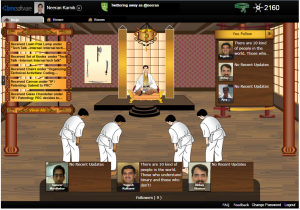(BMC Software Pune has created a by-the-techies, for-the-techies group, called The Ninja Club, to give the technical individual contributors in the company a place to learn, hang out, and get recognition for their work. This article about the Ninja Club is by guest author Neeran Karnik, an Architect at BMC.)
The problem is well known in the IT industry in India – why are smart techies tempted to switch to the management ladder, a few years into their careers? The industry loses technical talent, and quite possibly, gets saddled with mediocre management talent in the bargain! Techies who stay on the technical track complain about a lack of control, a lack of visibility, and a lack of rewards. Society also seems to treat “managers” as an exalted breed, and someone who remains an individual contributor is seen as having stagnated in his or her career.

Organizations are taking different approaches to tackle this problem – including creating explicit technical ladders, giving more high-profile recognition for technical accomplishments, even awarding junkets for creating IP. At BMC Software, we have taken a somewhat different approach – a grassroots effort in the technical community that is backed by, but not actively promoted by management. It’s loosely patterned after the martial arts, and is called the Ninja Club.
The Ninja Club is a forum created by techies, for techies. Its membership is self-selected (by invitation), purely on the basis of demonstrated accomplishments on the technical front. As such, membership itself is a badge of honour. In addition however, like in a martial arts discipline, members qualify for different coloured belts – starting with white, and earning their way to black. These belts are completely independent of the usual grades or bands in the HR system, and unrelated to promotions and performance evaluations. A points system has been put in place – a Ninja earns points for activities such as technical talks, participating in coding contests and ideation sessions, filing invention disclosures, publishing conference papers / whitepapers, etc. Points make you eligible for ‘promotion’ to the next coloured belt: white –> yellow –> green –> red –> black. But promotion is not necessarily automatic – in addition to points, the Ninja may have to get past, for example, an online programming test or an interview by other Ninjas at the higher belt level.
Like martial artists, the idea is that Ninjas get together regularly to practice their skills – coding, design, etc. – and to learn from each other. To that end, the Ninja Club organizes various activities such as coding contests, design review sessions, etc. for club members. We are also starting Special Interest Groups (SIGs) focused around technology areas like Big Data, Cloud Computing, SaaS, etc. Discussions can also be around the business domain (IT management and data centers, in BMC’s case) and customer use-cases, not necessarily on technology. Smaller groups of Ninjas can get together in SIGs to discuss, brainstorm, and do small side projects on such topics of their interest.
Such activities enable techies to network across their product teams, find role models and/or mentors, benefit from peer review of their ideas, and expand their sphere of influence. However, the club also organizes wider events that are open to everyone at BMC, not just its members. Over the past year, Ninja Club has organized the following different types of events:
- Ninjutsu: Quizzes focused on technology and programming – with questions ranging from tech trivia to ‘spot the bug in a snippet of code’
- Kaigi: Technical talks on hot topics like Hadoop, Android development…
- Tougi: Debates, where teams argue for or against a given proposition, such as the effects of Consumerization of IT, “BYOD”, or Desktop Virtualization
- Online contests like treasure hunts, crosswords, etc.

One key element of Ninja Club is its online presence, in the form of a gamified social network called eMee. This was developed at Persistent Systems, and heavily customized by them for BMC. Ninjas get their own profiles and avatars on eMee, using which they can showcase their technical skills, certifications and accomplishments. Points earned for various activities can be exchanged for ‘gifts’ that are used for decorating your house. Promotion to a higher belt results in your moving to a fancier house! Like in the martial arts, a Ninja can have ‘followers’. You can follow your role models or mentors, to keep track of their activities and status updates. Common news items are published to the “Ninja Times”, and visible to all. Non-Ninjas also get their own limited profiles, and the ability to follow Ninjas. A search mechanism allows anyone to find people with specific skills. This melding of the real and virtual worlds in eMee levels the playing field for smart programmers who may not be very social in the real world!
The hope is that this Ninja Club initiative will improve the technical vitality of the organization, and make technical careers more desirable and rewarding. By providing cross-team visibility, encouraging collaboration, and peer reviews of design and code, product functionality and quality should also improve over time. Success will eventually be measured in terms of the quality and growth of the technical populace at BMC Software, and being seen as the techies’ employer of choice in the region!
About the Author – Neeran Karnik
Neeran Karnik is an architect at BMC for their Bladelogic Server Automation product. Before that Neeran has worked at IBM India on the datacenter automation and cloud computing products in the Tivoli group, and as a Technical Director and Research at Symantec, and a Research Staff Member at IBM India Research Lab. Neeran has a Ph.D. in Computer Sciences from University of Minnesota, USA.
Neeran is also one of the co-founders of Cricinfo.
>> ” Its membership is self-selected (by invitation) ”
>> ” members qualify for different coloured belts – starting with white, and earning their way to black ”
A new caste system ?
Ummmm…You can’t really compare a system to the caste system when it is based on merit, eh? By this definition, all hierarchical organizations in the world are caste systems.
What is different about the Ninja club as described is that the belts are purely based on achievements listed and voted upon by peers (who do understand the technology you’ve worked on) in the Ninja club. Hence it is purely based on achievements, and not on the preferences of managers (who might not understand technology), or political savvy, or any other reasons for the official ranks and promotions.
Thanks Navin, I don’t have anything to add…
Agree with Navin. It is purely based on achievements and passion one shows towards technology and being a Ninja. In fact it also means that just because you become a Ninja member does not mean that it is a lifelong membership. You really have to be on your toes to remain cutting edge. Once again the analogy to martial arts is useful here. You do not remain black belt unless you continue to practice regularly.
Having said this, we do want it to be a bit “exclusive” and difficult to get into. We believe this will ensure people strive to get in as opposed to entitlement.
Absolutely great idea. Normally in big companies, at some point or the other, almost every techie finds himself stranded and isolated. Such initiatives really help and keep the tech flame ignited in brilliant minds.
Thanks Nitin.
How can one become a part of this group ?
where should one apply to become a part of this group.
@Sameer, this is currently a BMC in-house initiative, so it is only open to BMC employees so far. Some of the activities they do will be open to public, and these will be listed on the PuneTech Calendar. (This article was put on PuneTech to make other companies aware of an interesting experiment that is going on in Pune – something that they can adopt if found to be useful.)
That is sad. I got real exited with the concept. Will be definitely looking forward to public events organized by them. Thanx for share. 🙂
Sameer, feel free to adopt the concept in your own organization as well. At some stage, we should put together something similar but cross-organization — in fact, “PuneTech” sounds like a good name for that! 🙂
We (i.e. PuneTech) would love to do something like this, and it could be easily done if we get a little bit of support from a few organizations like BMC, Persistent.
great idea about “PuneTech” . My organization is a start up and only few developers in it but would definitely like to be part of cross-organization kind of events. looking forward to it. I think though belts should be awarded by some common body rather than keeping them per organization. It just increase the value of your accomplishments for other companies to evaluate. (It should not be another appraisal kind of system valued only in the current organizations of the employee). Just a thought.
Neeran,
Thanks for posting this; a quick view into how you folks manage Techtrack within the company. Interesting learnings there for all of us. Next time I am at BMC, I will try meet up with you – would love to hear more about how you folks run Techtrack.
ajay
Sure Ajay, would be glad to swap stories and experiences.
Hello Neeran, Suhas
I have gone through this post (though a little late though ? ) .. it’s really an impressive initiative.
Techie turning in to managers (and sometimes just because not enough options) is definitely a generic issue.
I would like to meet you to understand the implementation hurdles and how to make such initiatives sustainable on a long term basis … I find it a good ‘new year resolution’ to bring it to my organization.
Possible to catch you sometime @ BMC office or otherwise?
Thanks in advance,
Vivek
Sure Vivek, let’s meet next week.